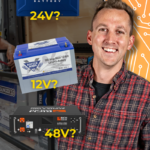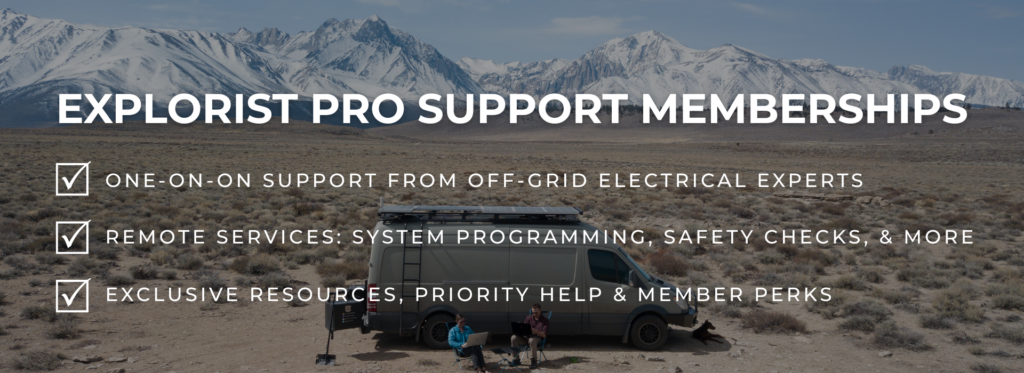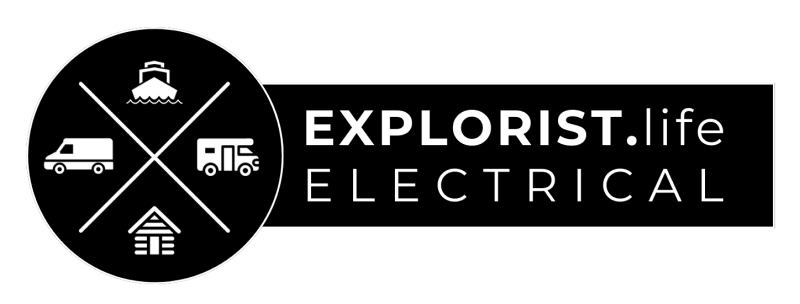
Welcome to the EXPLORIST.life Mobile, Marine, and Off-Grid Electrical Academy.
Today, we are going to cover how to choose the right battery for your electrical system. This lesson is going to be a little less data-driven and more experience-driven. Over the years, we’ve been involved in more than 30,000 electrical system installations, so we’ve learned a lot about what works well — and what doesn’t — when it comes to battery selection.

How to Choose a Battery – VIDEO

Overview
In the previous six lessons, we covered the technical and data-based aspects of battery selection — including power density, density per dollar, wiring in series and parallel, and differences between 12V, 24V, and 48V systems.
In this lesson, we’ll focus on real-world experience to help you determine which battery brand, configuration, and capacity best fits your needs.

Common Battery Manufacturers
At this point in the Academy, we carry and recommend a variety of battery brands, including:
- SOK Batteries
- Battle Born Batteries
- Rich Solar Batteries
- Expion 360 Batteries
- Victron Lithium Batteries
- Epoch Batteries
- Dakota Lithium Batteries
Each brand has its own strengths and applications, and part of this lesson is helping you match the right battery to your setup.

Key Considerations When Choosing a Battery
When designing a system, here are some of the most important factors to consider:
- Available Space
- How much room do you have for batteries?
- Can you fit a large-capacity unit, or will you need multiple smaller ones?
- System Voltage
- Are you building a 12V, 24V, or 48V system?
- Your battery choice will depend heavily on the system’s voltage.
- Operating Conditions
- Will your setup be in cold climates like northern Ontario or hot ones like Texas?
- Cold-weather setups may need battery heaters.
- Required Capacity

Comparing Battery Models
Let’s look at an example using the Epoch battery line:
- The Epoch Essentials 460Ah is not recommended for systems with a Victron MultiPlus 3kVA inverter because its Battery Management System (BMS) is rated for only 200A.
- A 3000W inverter on a 12V system could pull up to 250A — enough to trigger a shutdown.
- The Epoch Elite 460Ah model includes a higher-rated BMS and external communication capability with the Victron Cerbo GX, allowing you to monitor performance directly on your touchscreen.
If you prefer simplicity over advanced communications, batteries like the Epoch Essentials or Rich Solar options are excellent choices — they offer Bluetooth or standard shunt-based monitoring without complex setup.

48-Volt Systems
For larger systems such as off-grid homes or cabins, 48V batteries are becoming increasingly popular. Most 48V batteries come in a rack-style form factor, which is compact, stackable, and easy to maintain.
Advantages include:
- Built-in breakers (eliminating the need for external overcurrent protection)
- Standardized sizes for easy future replacement
- Reduced wiring complexity
When designing off-grid systems, warranty also becomes an important factor. Unlike RVs, home systems are typically intended for long-term use — so durability and support matter more.

Avoiding Compatibility Issues
Here are some common pitfalls to avoid:
- Don’t mix system voltages (for example, a 12V air conditioner with a 48V inverter setup).
- Plan your entire system before purchasing components.
- If you already have incompatible parts, you may need converters or redesigns — which can become expensive quickly.
When in doubt, reach out to shop.EXPLORIST.life/support before finalizing your system. We can help ensure all your components work together smoothly.

Purchasing & Support
We recommend purchasing components directly through shop.EXPLORIST.life.
Doing so allows us to provide integrated technical support for your entire system — batteries, inverters, wiring, and more — without needing to redirect you to multiple manufacturers.
All products we carry are priced the same as direct-from-manufacturer pricing, but buying through us ensures that you have a single point of contact for troubleshooting and design help.
Wrapping Up
That concludes the Battery Basics Chapter of the EXPLORIST.life Academy. You now have the knowledge and context to confidently choose and configure the right battery for your project.
Thanks for learning with us — and we’ll see you in the next lesson!

